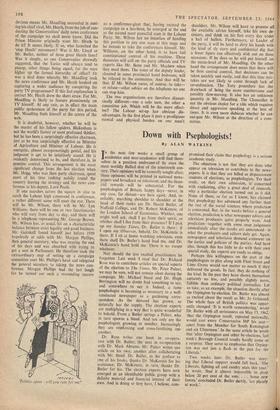dev ious means Mr. Maudling succeeded in oust- ing his chief
rival, Mr. Heath, from the job of con- ducting the Conservatives' daily news conference of the campaign we shall never know. Did the Prime Minister originally want Mr. Heath to do it? It seems likely. If so, who launched the `stop Heath' movement? Was it Mr. Lloyd or Mr. Butler, neither of them great Heath fans? Was it simply, as one Conservative shrewdly suggested, that the Tories will always tend to plump, other things being equal, for the man higher up the formal hierarchy of office? Or was a deal done whereby Mr. Maudling took the news conference and Mr. Heath banked on capturing a wider audience by compering the party TV programmes? If this last explanation is correct Mr. Heath drew the short straw. For Mr. Maudling is likely to feature prominently on TV himself. At any rate, as in effect the main public spokesman of the party for this period, Mr. Maudling finds himself at the centre of the web.
It is doubtful, however, whether he will be the master of his fellow spiders. Blakenham is not the world's fastest or most profound thinker, but he has been a surprisingly effective chairman, just as he was surprisingly effective as Minister of Agriculture and Minister of Labour. He is energetic, almost overpoweringly genial, and his judgment is apt to be intuitively sound. He is evidently determined to be, and therefore is, in genuine control. This arrangement is the most significant change from the last election when Mr. Hogg, who was then party chairman, spent most of his time rushing noisily round the country leaving the strategy and the news con- ference to his deputy, Lord Poole.
If one marches across the square in time to catch the Labour high command in conference, a rather different scene will meet the eye. There will be Mr. Wilson, there will be Mr. Len Williams, there will be one or two functionaries who will vary from day to day, and there will be a telephone representing Mr. George Brown. Mr. Wilson has, as usual, hit on a characteristic balance between strict legality and good business. Mr. Gaitskell found himself just before 1959 hopelessly at odds with Mr. Morgan Phillips, then general secretary, who was nearing the end of his days and was absorbed with trying to get a seat in Parliament. He therefore took the extraordinary step of setting up a campaign committee over Mr. Phillips's head and relegated the general secretary to taking the news con- ference. Morgan Phillips had the last laugh for he turned out such a resounding success 'Politics apart- you rote for me?' as a conference-giver that, having entered the campaign as a has-been, he emerged at the end as the second most powerful man in the Labour Party. Mr. Wilson has no intention of handing this position to any one man at this stage and he intends to take the conferences himself. Mr. Williams, on the other hand, is to have full constitutional control of his machine. These duumvirs will call on the party officials and TV experts like Mr. Benn and Mr. Mayhew when they need them. The voice of the deputy leader, closeted in some provincial hotel bedroom, will be relayed to the committee. And that will be that. If Mr. Wilson cares, of course, to take— or refuse—other advice on the telephone no one can stop him.
The two organisations are therefore diamet- rically different—one a solo turn, the other a committee job. Which will be the more effect- ive? The Labour set-up has obvious dis- advantages. In the first place it puts a prodigious mental and physical burden on one man's
shoulders. Mr. Wilson will have to process all the available advice himself, take his own de- cisions, and think on his feet every day under a hail of bullets. Furthermore, as Leader of the party, it will be hard to dirty his hands with the kind of sly story and confidential dig that a lesser figure can effectively dish out on these occasions. If he does so he will put himself on the status-level of Mr. Maudling. On the other hand the arrangement does mean that there will be firm central control, that decisions can be taken quickly and easily, and that this time mis- takes are not likely to come through lack of co-ordination. The Tory procedure has the ; drawback of being the more cumbersome and possibly slow-moving. It also has an unknown quantity in Mr. Maudling. The Chancellor is not the obvious choice for a role which requires direct and aggressive speaking at the best of times. It is even more dubious whether he can out-gun Mr. Wilson at the direction of a com- mittee.




























 Previous page
Previous page